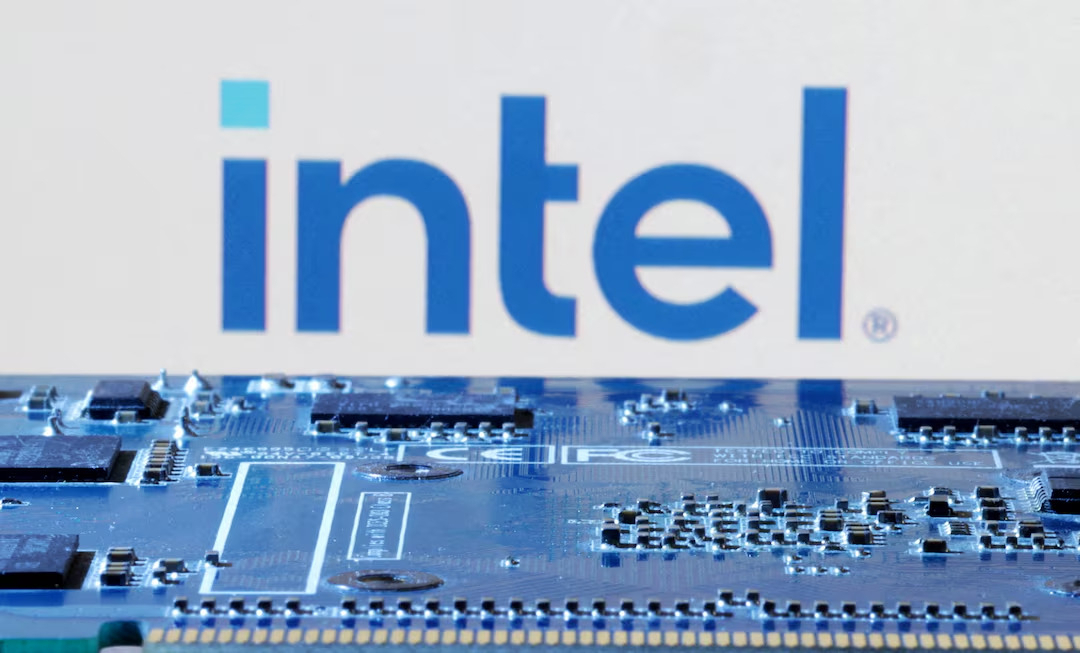 |
Intel logo is seen near computer motherboard in this illustration taken on Jan 8, 2024. (Reuters) |
Intel, once the world’s leader in both designing and supplying advanced chips, has decided to spin off its chip manufacturing business in part of the efforts to recover from massive losses. For Samsung Electronics, the rival’s spin-off could pose a threat if successful, according to experts here on Thursday.
At the same time, Intel’s decision is raising a strategic question for Samsung on how to stay competitive across all fronts of chip design and manufacturing as an integrated device manufacturer, when other emerging industry giants are gaining ground by focusing on a single area of expertise.
In the latest development, Intel Chief Executive Officer Pat Gelsinger said Monday he plans to turn the foundry business into an independent unit with its own board and seek outside capital.
"It (the spin-off) provides our external foundry customers and suppliers with clearer separation and independence from the rest of Intel," Gelsinger said in the message he sent to the employees over Intel's transformation plan.
"Importantly, it also gives us future flexibility to evaluate independent sources of funding and optimize the capital structure of each business to maximize growth and shareholder value creation."
According to analysts cited by market tracker TrendForce, Intel's decision is a "much-needed" temporary measure for the company to gain the trust of potential customers that are hesitating entrusting their chip designs to a competitor's foundry division.
In the global foundry market, Taiwan-based TSMC is in the dominant lead with a 62 percent share, a great distance ahead of runnerup Samsung Electronics, taking a 13 percent share.
Intel is out of the top 10. But the company laid out an ambitious goal to catch up to Samsung by 2030, and has been aggressively investing in the foundry business. The company has reportedly purchased top-notch, pricey chipmaking equipment from ASML, and is building the world's most advanced chip production facility with 1.5-nanometer process nodes.
If Intel's foundry spin-off goes as planned and successfully attracts funding from outside, the company could get a better chance of attracting tech heavyweights, according to experts.
Considering how Samsung and other competitors struggle to attract major tech giants like Apple and Qualcomm, which have strong bonds with TSMC, Intel might fare better in that case, the analysts said.
"If Intel can attract investment through initial public offering, that would be ideal. If it fails to do so, the company could have trouble leveraging funds from the parent company," Kim Yang-paeng, a researcher at the Korea Institute of Industrial Economics and Trade, said.
"If Intel Foundry succeeds, Samsung could also face pressure to spin off its own foundry business."
Considering how Samsung and other competitors struggle to take away the major tech giants as their clients from TSMC, analysts view that Intel's foundry spin-off could offer the company a better chance of attracting the heavyweights.
Intel’s chief financial officer also has said its foundry will be making “meaningful” earnings by 2027, and Gelsinger also revealed the company signed a multiyear, multi-billion-dollar, agreement to produce chips for Amazon’s Web Services business.
The spin-off also signals at Intel's shift away from its IDM status. With its foundry business going independent, Intel would be able to concentrate the rest of its resources on what they are good at -- supplying CPUs -- analysts say.
This strategic move, shows that Samsung, as an IDM, should also reconsider its strategies to navigate the fast-changing market, market watchers said.
“IDMs appear to operate in multiple areas, but their competitive edge comes from their core strengths," an industry official said under the condition of anonymity. "For Intel, their strength is in CPUs. For Samsung, it is DRAM."
In an effort to boost performance, Samsung is seen concentrating its resources in their strong memory chips. The tech giant is expected to spend about $9.5 billion on DRAM facilities, which is up 9.2 percent from last year’s spending of $8.7 billion, and the largest amount since 2020.
The company is also expected to increase memory chip production facilities at its plant in Pyeongtaek, Gyeonggi Province, scrapping the original plan to build a foundry facility there.
The tech giant is also considering to restructure its semiconductor division under the lead of Vice Chairman Jun Young-hyun, who has pointed out how the current team-based structure is creating conflicts of interest inside the company and holding back making progress.
Being an IDM firm, the massive size of the organization and the many different departments in charge of different tasks of chip design, process development and manufacturing, are seen as factors hindering efficiency.
Under the planned restructuring, the company aims to consolidate departments and shift towards a more "project-oriented" structure to promote internal collaboration, according to industry sources.






![[Lee Byung-jong] The perils of political leadership](http://res.heraldm.com/phpwas/restmb_idxmake.php?idx=644&simg=/content/image/2024/12/19/20241219050082_0.jpg)
